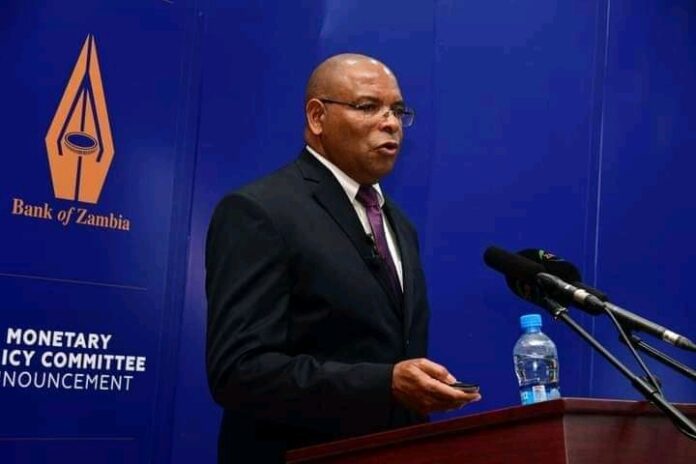BOZ MAINTAINS POLICY RATE AT 13.5%
…the decision took into account the impact of the drought as well as that of the past successive increases in the Policy Rate
Lusaka… Wednesday August 14, 2024 (SMART EAGLES)
The Bank of Zambia (BoZ) has kept its key benchmark interest rate unchanged at 13.5 percent.
BoZ Governor Dr. Denny Kalyalya says at its Meeting held on August 12-13, 2024, the Monetary Policy Committee decided to maintain the Policy Rate at 13.5 percent.
Dr. Kalyalya said while actual and projected inflation remain elevated relative to the 6-8 percent target band, the Committee judged that the current monetary policy stance is appropriate.
He said this decision took into account the impact of the drought as well as that of the past successive increases in the Policy Rate, upward adjustments in the statutory reserve ratio, and recent reforms in the foreign exchange market.
“In taking the decision to maintain the Policy Rate as opposed to raising it, the Committee also took into account the impact on the stability of the financial system and growth, particularly in 2024, in the wake of the drought,” he told journalists in Lusaka.
“Average inflation rose further to 14.6 percent in the second quarter of 2024 from 13.5 percent in the first quarter of 2024. In July, annual inflation increased to 15.4 percent from 15.2 percent in June. The persistent depreciation of the Kwacha against major currencies, as well as rising prices of food (maize grain, maize products, and vegetables) and energy, particularly fuel, due to constrained supply continued to drive inflation in the second quarter.”
He stated that at the May MPC Meeting, inflation was projected to move into the 6-8 percent target band in the last quarter of 2025.
Dr. Kalyalya further said the current forecast, however, points to inflation staying above the target band throughout the forecast horizon.
“Inflation for 2024 is now projected at 15.3 percent compared to 13.7 percent in May, largely reflecting the persistent depreciation of the Kwacha and the adverse impact of the drought on food and energy. Inflation is, however, forecast to moderate to 12.7 percent in 2025, albeit higher than the 9.8 percent reported in the May 2024 MPC Meeting. In the first half of 2026, inflation is expected to be 10.8 percent. The moderation in inflation is mainly on account of expected improvement in external sector performance and declining world food prices,” he continued.
“Key upside risks to the inflation outlook remain broadly unchanged from May, but exacerbated by extended hours of electricity load management, as well as continued geopolitical conflicts and tight global financial conditions.”
The BoZ boss also indicated that mining tax receipts remitted directly to the Bank increased to US$252.5 million in the second quarter from US$190.8 million in the first quarter.
He said due to improved supply, the Bank scaled down market support to US$275.0 million from US$369 million in the first quarter.
“Gross international reserves increased to US$3.9 billion (equivalent to 4.3 months of import cover) at end-June from US$3.6 billion (equivalent to 3.9 months of import cover) at end-March. This was mainly on account of the US$569.6 million disbursement by the IMF under the ECF arrangement. In the second quarter of 2024, gold purchases amounted to US$8.6 million. This brings the total holdings to US$176.7 million since the Bank started purchasing gold locally,” he indicated.
“Domestic credit growth picked up to 11.7 percent at end-June from 10.5 percent at end-March mostly due to increased lending to the private sector. Private sector credit expanded by 35.8 percent in June in nominal terms compared to 30.5 percent in March.”
He disclosed that lending to Government through
Government securities contracted further as liquidity conditions remained broadly tight.
“Economic activity remained weak in the second quarter as business conditions deteriorated in the wake of the adverse impact of the drought. Growth prospects for 2024 remain pessimistic with growth projected at 2.3 percent on account of the adverse impact of the drought on agriculture and energy sectors. Growth is expected to rebound in 2025, attributed to the recovery in mining and agriculture sectors, and sustained expansion of ICT, financial and insurance, as well as wholesale and retail trade sectors,” he concluded.
#SmartEagles2024

So guys on topics that really matter , no comment. But the moment you “Mealie Meal” then it’s 100 comments but this topic here is what make unga go up or down. Comment kaili tiwone.